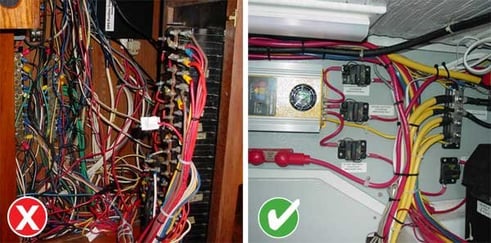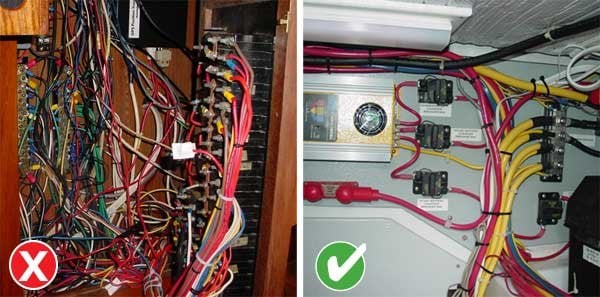Green Yachts has heard boat brokers tell boat buyers, “Don’t buy an electric boat, they are dangerous!”
And that clearly shows they don’t know what they are talking about. To find out why, read on.
Whether one is buying a car or boat with an internal combustion engine or an electric motor, safety is a key concern. In our opinion, it is a false argument to say that a gas/diesel engine or an electric motor is more dangerous
or more safe. For example, gas Mercedes sedans and SUVs from 2015-2017 are some of the most likely cars to catch fire due to an overheating starter port and electric Hyundai Konas were just recalled over risk of battery fire.
On the other side of the spectrum, the electric Tesla Model 3 achieved the lowest probability of injury of any vehicle ever tested by NHTSA and a perfect 5-star rating in every safety category and subcategory. The gas-powered Toyota Camry, Honda Insight and Kia Optima are considered some of the safest cars on the road and also earne
For those who want to make the gas vs electric argument on safety, our message is stop dividing our country, our drivers and our boaters and learn the real answer, which is that well-designed electric and well-designed gas/diesel cars and boats are safe, poorly designed electric and gas/diesel boats are not.d perfect 5-star ratings from the NHTSA in all categories.
So how does one tell the difference?
Smart Batteries and the BMS (Battery Management System) – this is the most important factor to electric boat safet. The best way to stop a fire is to prevent it. Smart batteries have thermal regulation safeguards that cause them to shut down before a battery’s temperature and state of charge differentials between battery cells go outside of normal operating conditions. A good BMS will identify depth of discharge differentials between batteries and rebalance batteries in order to prevent any one battery from overworking. We are big fans of DIY projects on boats and low-cost solutions, but not when it comes to battery banks. Investing in a good battery bank is the most important safety protocol one can take on an electric boat.
Motor Cooling – small electric motors that are only used to get in and out of marinas don’t need to be cooled. But for any use beyond this in terms of motor size or length of use, an electric motor needs to be cooled. There are passive and active cooling strategies and motors can be air or liquid cooled. Cooling mechanisms work well when properly installed.
Proper Wiring – Wiring that is not done properly is a key safety risk in any boat for all systems on a boat and not just electric propulsion. All systems on a boat

need to be properly wired by a marine mechanic to ABYC standards so that the right gauge wire is used, fuses and circuit breakers guard against a short in the wiring and proper wiring connections are used that prevent against water intrusion and wire connections coming undone with the constant rattling and vibrating of a moving boat. These are some of the important aspects of safe wiring.
Regular Maintenance – Though electric motors require far less maintenance than gas/diesel engines, all boats and all boat systems require regular maintenance in order to function well and be safe. Checking battery terminals for corrosion, listening for errant sounds, and changing fluids at specified intervals are just some of the things boat owners should do to maintain their boats. When buying any boat, be sure to ask for a maintenance schedule for the boat and all boat systems aboard. Specifically for an electric motor, the annual maintenance should take less than 30 minutes a year and consists of things such as changing the gear oil and checking that all sensors are working.
In summary, if your boat has batteries that are designed to be safe, your electric motor is liquid or air cooled, the wiring on your boat meets ABYC standards, and you or a marine professional properly maintain your boat, your boat is safe whether you choose a gas or electric boat.
We at Green Yachts want to ask Americans to stop arguing about the safety of gas vs electric cars or gas vs electric boats and start talking about how all of us can be safe together by focusing on how smart our batteries are, how well our boats are maintained and how well they meets ABYC standards. It’s not great cocktail conversation to say, “my battery has an inline fuse within 7 inches of the battery terminal,” but it more accurately determines safety than arguing gas vs electric. For more information about marine electrical standards, here is a link to the ABYC marine standards: https://abycinc.org/page/standards.
If you have any questions about how to design a safe electric propulsion system on your boat, please contact Green Yachts. We are excited to have one of our ABYC certified mechanics work with you to design an electric propulsion system that is safe and meets your boating needs.



Leave Comment